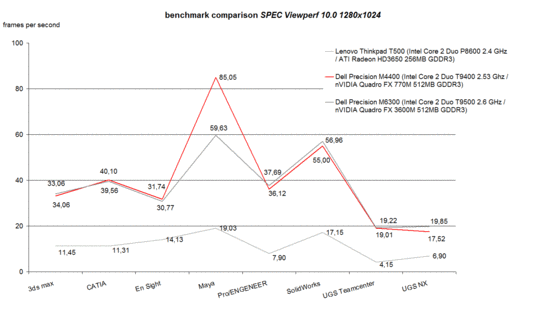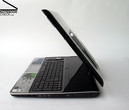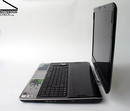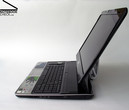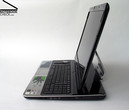Wie eingangs schon erwähnt, verrichtet der innovative Display-Klappmechanismus eine einwandfreie Arbeit. Abgesehen von leisen Knarzgeräuschen lässt sich das Panel ohne Probleme in eine für den Benutzer angenehme Position bringen. Auf einen Verriegelungsmechanismus wird dabei jedoch verzichtet.
Review Lenovo Thinkpad T500 Notebook
One for all.
The models of the T-series were always the solid base of Lenovo's complete product range. With display sizes of 14.1" and 15.4", equipped with modern and, if desired, powerful hardware, the current T-models can cover a wide range between mobility and performance. Combined with typical Thinkpad qualities, they are serious contenders among business notebooks.
The new models of the T-series, the Thinkpad T500 with 15.4” widescreen display and the Thinkpad T400 with 14.1” display, replace Lenovos existing T61 models. But using the screen sizes as product names was not the only change to the T-series. The TXXp models, consisting of high performance mobile workstations made by Lenovo, will be sold as a separate series called Thinkpad W500 (15.4”) and W700 (17”). Therefore, the W-series continues where the T-models reach their performance limits.
Case
Those who hoped the T500 models would use a significantly altered case will be disappointed. However, the question is whether anybody would even want a different case.
At least Lenovo's designers must have thought that way, and decided to leave the case as it was. The T500 looks thus virtually identical to previous T-models.
“Never change a running system!” – Many computer users will agree, but it is not necessarily the best guide for producers and developers, who should constantly strife for improvement and innovation. On the other hand, one has to admit that the case is still rock solid after years of optimization, despite the lack of changes compared with the T61. Furthermore, the hardware of the T500 was significantly improved.
However, the case of the Thinkpad T500 is still not entirely fault free. For example, the familiar case weaknesses around the Ultrabay drive slot and on the plastic cover above the keyboard are still present. The case tends to flex, and sometimes even creak, if pressure is applied to these areas.
Other than that, the case has barely any weaknesses regarding stability. The base unit is flexural rigid and allows handling of the laptop as long as one doesn’t touch the optical drive. Very impressive is once again the robust display. Although the display lid bends noticeable under pressure, it is almost impossible to provoke changes on the active display. It is thus still possible to lift the T500 on one edge of the display without problems. The only disadvantage of the display is the rather difficult cleaning of the display lid, because fingerprints seem to stick to it very well.
The Thinkpad T500 uses the same massive and very robust display metal hinges as its predecessor. They keep the display firmly in position, but still allow effortless adjustments of the display lid. The dual hook closing system and the Clamshell design keep display securely closed and neatly aligned with the base unit. Entering of dust and other small objects is thus virtually impossible.
Interface equipment
The interface equipment was one of the first areas where Lenovo managed to achieve improvements over the T61 models. Still unchanged is the 'right-hand optimization' of the notebook. There are hardly any ports on the right edge of the T500 and the modem connection was pushed to the very back of the right side. Most of the right side is thus filled with the optical drive, and annoying cables and plugs aren’t likely to be found on this side of the notebook.
The backside contains only the power supply, a Kensington Lock, as well as the centrally placed battery. This has the advantage that bigger battery packs, like for example the 9-cell high performance battery, which stands slightly out from the case, can be used with the notebook.
Not surprisingly, most of the connections and ports end up on the left side, which is rather bad for left handed users. Here the T500 offers an analogue VGA port, a new digital display port, the LAN connection, three USB 2.0 ports, and a combination of ExpressCard and PCCard slot close to the front.
The two 3.5mm audio ports for ear- and microphones, as well as the FirewWre port, are on the front side.
If you would rather keep your left side free from cable clutter, you could use the docking port on the bottom of the notebook to extend the number of ports with a compatble docking station, and to clean up the working space on the left and right of the notebook.
The Lenovo Thinkpad T500 offers an integrated Gigabit network module (Intel 82567LM) for high performance communication over cable. An Intel WiFi Link 5100 or an Intel 5300 wireless LAN module provide the T500 with current WLAN state of the art. The Intel 5300 ABGN chip allows maximum data transfers of up to 450Mbps (300Mbps Intel 5100).
Depending on the hardware configuration, the T500 can also contain an integrated Bluetooth 2.1 module, or a built-in UMTS broadband modem. Because even the standard models of the notebook contain the necessary cables and antennas, it is also possible to build in the broadband modems later.
The T500 offers several security features, like a TPM chip (Trusted Platform Module), which can encrypt data on your hard disk, a finger print reader (depending on configuration), or a Smartcard reader, which can be optionally connected to the PC-Card slot of the notebook. The shock resistant hard disk on the other hand, is a standard feature of all Thinkpads.
Not only the hardware features but also the integrated ThinkVantage software improves security. Pressing the blue ThinkVantage button above the keyboard starts the ThinkVantage Productivity Center, a special program which provides several different notebook settings. It is for example possible to change the settings of different network connections and manage them, to backup and restore data, to manage passwords, and to download current updates for the notebook.
Various accessories are available for the Thinkpad T500, like notebook carrying cases, different docking solutions, batteries, alternative hardware for the Ultrabay drive slot (Blu-Ray, second hard disk, battery), and external input devices.
The choice of operation system is between all common Vista variants and Windows XP, which is still often used especially in the business notebooks sector. Our test sample was equipped with Windows XP Professional.
Lenovo grants a 3 year international bring-in warranty on the T500, which means a broken notebook has to be sent to them. On-site service on the next day can be bought with a warranty extension, which costs 109 Euro.
Input Devices
Lenovo treats the input devices the same way as it did the case and implements only small, hardly noticeable changes. The classical and for several years unchanged IBM keyboard, is also built-in in the T500, and stands out with its layout and the clear structure, which is achieved by grouping the individual function keys.
The typing feeling of the keyboard can be described as 'typical-Thinkpad'. The keys have a clear pressure point and a generous length of stroke. The size of the keys is unchanged.
However, the T500 has two negative points, which were also noticeable on the cheaper SL-models from Lenovo: The keyboard unit isn’t as neatly put into the case as it used to be in older models of the Thinkpad series, and the spacebar is rather noisy, which is negatively noticeable while typing.
Although the keyboard was always one of the main advantages of the famous Thinkpad business notebooks and benchmark for other brands, Lenovo is more and more being criticized in this discipline, sometimes even from customers who have been loyal to the brand for years.
The red TrackPoint in the middle of the keyboard on the other hand, is still the best of its kind. One has to admit, that no other producer has ever managed to build a comparably ergonomically designed and user-friendly mouse replacement. This holds true for the TrackPoint itself, its responsiveness, and for its three buttons. Everything fits perfectly together.
The touchpad has a surface which is pleasant to use and a vertical scrolling area. The two touchpad keys are convenient to use, due to their location on the front edge of the notebook, no matter whether they are pressed with one thumb while navigating with one hand, or while using the touchpad with two hands.
Display
Lenovo offers currently two different displays for the T500. One is a 1280x800 WXGA panel with LED backlight and the other is a 1680x1050 WSXGA display. The WSXGA panel is clearly superior in terms of working space and resolution, especially when working with several open windows at the same time. The LED panel on the other hand, has higher brightness and better illumination.
However, if you really need a lot of space for CAD programs or image editing, then even the WSXGA panel might be too limited, and you probably better take a look at the Thinkpad W500 series, which offers a WUXGA (1920x1200 pixel) display.
Our test sample was equipped with the 1680x1050 WSXGA panel. It reached a maximal value of 203cd/m² in the central display area, and thus fulfilled the producer specification of 200 nits (cd/m²).
Although the brightness dropped in the left upper display area to a minimum of 169.4cd/m², the display still attained a good illumination of 83.7%.
| |||||||||||||||||||||||||
Brightness Distribution: 84 %
Contrast: 396:1 (Black: 0.51 cd/m²)
The WXGA display also achieves a good contrast ratio. A minimum brightness of 0.51cd/m2 (black value) equals a good maximum contrast ratio of 396:1.
While calibrating the display with the Spyder 3 tool from the company Datacolor, it was noticeable that the default image of the WXGA panel had too much of a blue tint, which made the image appear too cold.
Due to the maximum brightness of 200cd/m², which is available even if the notebook runs on batteries, and the notebook's matte display surface, it is also outdoors capable. But higher brightness and better distributed illumination would be an advantage. Therefore, the LED version is probably the better choice for outdoor usage, since LED displays achieve better results than displays with CCFL technology.
Not really a strong aspect of the display was the viewing angle stability. Even small deviations from the optimal viewing angle turned the screen darker, especially in vertical direction.
The display was more stable in horizontal direction, but flatter viewing angles still result in a contrast loss.
Video of the display's viewing angles
Performance
The Thinkpad T-series was always the basis of Lenovo’s business notebook product range. The goal of these laptops is to appeal to a wide range of customers. For this reason, the T-models always offered a number of modern and powerful hardware options to meet the individual needs and requirements of the user.
The T-series stayed true to this idea up to now. Although the high performance p-models were separated from the T-series and turned into a new workstation segment as mentioned before, it is still possible to choose from many different hardware options. However, it always used to be a trade off between performance and mobility. The Thinkpad T-series tries to improve exactly this situation. For the first time it offers a switch option between dedicated and integrated graphics on the same notebook, which became possible due to the new Express 45 chipset made by Intel (Centrino 2).
Although there were some notebooks which offered this option before, it never really gained acceptance, because the user had to restart the system to switch graphics cards. However, Intel’s new Montevina platform now supports on the fly switching of graphics cards. In the case of the Lenovo Thinkpad T500 this can be done by clicking the battery icon on the keyboard.
However, Windows Vista is required.
Windows XP users can still use this switching function, but it is much less convenient. In order to switch graphics cards in Windows XP it is necessary to restart the system, and to manually switch between integrated and dedicated graphics card in the Bios (F2 on system start). This was also the case with our test sample, which had a Windows XP operation system.
The Lenovo Thinkpad also offers a hardware configuration which doesn’t use the switching function. If you only use office programs like Word, Excel, mail and internet, then the model with integrated Intel 4500M HD graphics would be a possibility. In this case the notebook doesn’t have a dedicated graphics card at all. The alternative would be the combination of ATI Mobility Radeon HD 3650 graphics card and the integrated Intel GMA 4500M HD graphics chip.
The comparison between the two graphics chips in the PC Mark 2005 benchmark test showed a distinct difference between the two results. This is mainly because graphics performance significantly affects the PC Mark benchmark results. However, the integrated graphics chip has more than enough power for real world office and internet applications. Only 3D heavy applications can really use the additional power of the dedicated graphics card.

Since the 3D Mark benchmark test is first and foremost designed to measure gaming performance, the Cinebench R10 benchmark test is more appropriate to rate the Open GL performance of the Lenovo T500, which is important for many 3D visualization applications.
The Lenovo Thinkpad T500 achieved 4556 points in the OpenGL shading test, which was a very good result. It manages to beat both the nVIDIA Quadro NVS 140M, and the successor, the NVS 160M, which were built into the Thinkpad T61. The comparison of the T500 with integrated and dedicated graphics card also showed the extreme performance difference, and the usefulness of the graphics switching function for occasional performance demands
However, the SPEC Viewperf 10.0 benchmark test, which analyses the performance of professional 3D applications, like 3D Studio Max, CATIA, Maya, and others, puts the performance of the T500 a bit into perspective. It only achieved modest results compared with the 15.4” workstation from Dell, the Precision M4400 with Quadro FX 770M graphics. But to be fair, the M4400 doesn’t really play in the same league as the T500, and should be compared to the W500.
Lenovo uses one of the current Centrino 2 Penryn series CPUs from Intel as processor. Starting with a P8400 CPU with 2.26GHz and 3MB L2-cache, and going up to a T9600 with 2.8GHz and 6MB L2-cache, the choice of processors is not only influenced by performance requirements, which are significantly higher for rendering or other demanding tasks than for normal office usage, but also by the budget; The difference between the cheapest and fastest processor is several hundred Euro.
The price is obviously also a point to consider when choosing RAM and hard disk. Due to the Intel Centrino 2 chipset, the Thinkpad T500 can theoretically use up to 8GB of high performance DDR3 RAM modules with 1066MHz clock rate (PC3-8500), it’s just a matter of price. Our test sample has only 2048MB DDR2 RAM, which has a positive effect on the price of the notebook, but doesn’t really use the potential of the hardware.
There are various hard disks to choose from, since sellers equip the notebook with almost any available hard disk. It is also possible to put a second hard disk into the Ultrabay drive slot, which either increases hard disk space, or mirrors the data on the main hard disk in case one of them fails.
Our test sample had a HTS542516K9S hard disk from Hitachi with 5400 r/min and a capacity of 160GB.
With transfer rates of up to 53.1 MB/sec and an access time of 17.0 milliseconds in the HD/Tune benchmark test, it reached a satisfying result.
| 3DMark 2001SE Standard | 27281 points | |
| 3DMark 03 Standard | 11453 points | |
| 3DMark 05 Standard | 8617 points | |
| 3DMark 06 Standard Score | 3872 points | |
Help | ||
| PCMark 05 Standard | 5258 points | |
Help | ||
| Cinebench R10 | |||
| Settings | Value | ||
| Shading 32Bit | 4556 Points | ||
| Rendering Multiple CPUs 32Bit | 4898 Points | ||
| Rendering Single 32Bit | 2637 Points | ||
Emissions
Noise level
The Lenovo Thinkpad T500 turned out to be very quiet in our test. Additionally, it hardly mattered whether the notebook used the integrated or dedicated graphics card. It was virtually silent in office mode. The fan was either deactivated, or turned with the lowest speed and a noise level of only 31.5dB(A).
This didn’t even change much when running demanding applications. The noise level raised slightly to 34.5dB(A), or 35.2dB(A) when watching DVD movies. However, the drive got very loud with 46.8dB(A) during data transfers.
Noise level
| Idle |
| 31.5 / 31.5 / 31.5 dB(A) |
| HDD |
| 32.5 dB(A) |
| DVD |
| 35.2 / 46.8 dB(A) |
| Load |
| 34.5 / 34.5 dB(A) |
 | ||
30 dB silent 40 dB(A) audible 50 dB(A) loud |
||
min: | ||
Temperature
Surface temperatures stayed always low despite the rather inactive fan. The top surface warmed up to just 32.7°C, and the usually warmer bottom side to 36.3°C. Considering the performance and silence of the Thinpad T500, it is hard to believe it keeps so cool.
(+) The maximum temperature on the upper side is 32.7 °C / 91 F, compared to the average of 34.3 °C / 94 F, ranging from 21.2 to 62.5 °C for the class Office.
(+) The bottom heats up to a maximum of 36.3 °C / 97 F, compared to the average of 36.8 °C / 98 F
(+) The palmrests and touchpad are reaching skin temperature as a maximum (32.4 °C / 90.3 F) and are therefore not hot.
(-) The average temperature of the palmrest area of similar devices was 27.5 °C / 81.5 F (-4.9 °C / -8.8 F).
Loudspeakers
The integrated loudspeakers were all moved above the keyboard, unlike the speakers of the T61 models. The sound resounded slightly, with clear heights, but also a noticeable weak bass. But the speakers are still acceptable for low volume listening. If one desires high quality sound, it is always possible to use the earphone port: the test with the Sennheiser PC131 headset showed good results.
Battery life
Lenovo’s Thinkpad T500 usually contains a 6-cell lithium ion battery with a capacity of 5200mAh (56.16Wh). Furthermore, there is also a 9-cell battery and an Ultrabay battery available. The larger 9-cell main battery is identical with the one for the T61 models and stands out a bit from the back of the notebook case. As opposed to the 9-cell battery, the Ultrabay batteries of the T61 models cannot be used in the Thinkpad T500. However, it is possible to put a T500 Ultrabay battery into the Ultrabay slot of a T61 model.
The 6-cell battery didn’t fit neatly into the case and wobbled slightly. The T500 notebook managed to run the BatteryEater Readers test (minimum brightness, activated energy saving mode, deactivated WLAN) for maximal 276 minutes with the 6-cell battery. Under load, with the BatteryEater Classic test (maximum brightness, maximum performance, everything turned on), it only took 61 minutes to deplete the battery. Both results were achieved with activated graphics card. Furthermore, ATI powerplay was deactivated in the Classic test, which means the notebook delivered the same performance as if it had been plugged in.
When we did the same test with the integrated Intel 4500M HD graphics, instead of the dedicated ATI graphics card, the Thinkpad T500 ran the BatteryEater Readers test for 356 minutes. This means 80 minutes longer battery life.
The battery life of the T500 in the Classic test rose to 82 minutes with integrated graphics card, which is a plus of 22 minutes.
The power consumption shows that the Thinkpad T500 consumes about 3.5W less energy with the integrated graphics card, compared with the dedicated ATI graphics card. The lower energy consumption of the integrated chipset is also noticeable under load.
| ATI Mobility Radeon HD3650 | |
| Off / Standby | |
| Idle | |
| Load |
|
| Intel GMA 4500MHD | |
| Off / Standby | |
| Idle | |
| Load |
|
Key:
min: | |
Verdict
The Thinkpad T500 is a modern version of the T61 series, and positions itself once again as professional all-round notebook with extensive communication features and good mobility. An important change was the new Intel Express 45 chip set, which comes with new features like the Intel Centrino 2 processor, high performance communication modules (WLAN, UMTS,…), and as a highlight of the T500 series a function to switch between integrated and dedicated graphics card.
The base for this hardware is a very robust case, which stands out with a stable display and massive hinges. Unfortunately, some well known weaknesses haven’t been removed, like for example that it gives around the optical drive.
The input devices are also familiar from previous Thinkpads. The keyboard offers a very user-friendly layout, but workmanship isn’t as good as of older models. The TrackPoint/touchpad combination on the other hand, is excellent as always.
The various Intel Core 2 Duo processors, as well as a combination of ATI mobility Radeon HD3650 and an integrated Intel GMA 4500M HD graphics chip keep the balance between performance and mobility. Especially the graphics switching feature can significantly extend battery life. If that is still not enough, a large 9-cell main battery or an additional Ultrabay battery can further improve mobility.
The Lenovo Thinkpad T500 is a good office notebook, because its emissions are very low. It is quiet and its surface doesn’t get very warm. The Lenovo Thinkpad T500 can thus be recommended to professional or private office users, who want to be mobile, but still need some performance from time to time.
We kindly thank Planet Notebook for providing us with the test sample. You can configurate and buy the notebook Here.

















